<center>
# How to get blog post ideas as a developer
*Written by [Gourav Goyal](https://gourav.io). Originally published 2022-08-31 on the [Monadical blog](https://monadical.com/blog.html).*
</center>
When I first learned that writing online could make my resume stand out and even lend me a cushy job, I got excited and opened a notepad, but immediately hit a roadblock. I didn’t know what to write about in the first place. I felt like everything had been written and published online, and I had nothing new or interesting to write about. Newsflash: I couldn’t have been more wrong!
Over the past few years, I’ve written many articles on different platforms that have been collectively read by 500k+ people. Some [of](https://gourav.io/blog/first-donation-on-open-source-side-project) [them](https://gourav.io/blog/my-simple-github-project-went-viral) even landed on the first page of HackerNews! I got approached for jobs by many companies, including the one ([Monadical](https://monadical.com/)) I’m currently working for 😁.
So, how do I come up with blog ideas? Well, whenever I hit writer’s block, I explore these four areas. They’ve never failed to help me find ideas for my next article. They are:
1. Draw inspiration from within yourself
2. Content research tools and tech communities
3. Inspiration from other people’s tech blogs
4. Summarise concepts from long-form content
Let’s take a closer look at these below.
## Draw inspiration from within yourself
### Share your experience working on a project or technology
Write about your overall experience on a particular project or technology. Some important points that readers find useful are key takeaway lessons, and how to avoid common pitfalls when working on a similar project. Many devs might find it surprising, but one of the most viewed [questions](https://stackoverflow.com/questions/1783405/how-do-i-check-out-a-remote-git-branch) (7M views) on StackOverflow is simply “How to check out a remote Git branch?”. But there’s a reason for that. Even things that you think are obvious can be insightful to people who are new to this or don’t have your experience. Young developers in particular benefit significantly from seeing theoretical concepts applied in practical, real-life settings.
Blog post examples:
- I worked on the framework X for Y period, and here’s my experience so far
- What I learned from building X App using Y language/tech stack/framework
- How to resolve X issue in Y framework
- How to build an API server using X framework
- The best software company I have ever worked for, and what I learned
- Most difficult concepts to learn about language X
- Pros and Cons of using X database/library
### Take notes about what you’re learning or have recently learned, and share with others
The ideal time to teach someone is the time when you’ve just learned something, and it’s still fresh in your mind. You still have that [beginner’s mind](https://en.wikipedia.org/wiki/Shoshin)*,* so you can easily relate to others who are about to learn the same thing and teach them effectively.
Let’s suppose you’re learning something new, like a database you’ve never worked on or the latest hip JS framework from last week. You quickly discover that all the information you need to learn that thing is not available in one place. You browse the documentation, blogs, StackOverflow, and GitHub discussions, and (if you’re the bold type) maybe even ask for help in subreddits, Discord servers, etc. What you’ve just done is gold! Precious, precious gold, especially if the official documentation isn’t super dev-friendly (e.g., lacks code examples and explanations). Don’t throw your gold away; share it with the rest of us!
As you work, quickly jot down these important basics, resources, better code samples, cheat sheets, etc., so that future learners don’t end up painstakingly crawling through the same scattered docs, chat rooms, and forums.
Even just by copying links to a few disparate sources into a doc, you’re basically 50% of the way to a solid blog post.
Examples:
- An intro to setting up an API server using Deno
- Async programming in Javascript vs Python
- How to see all running Amazon EC2 instances across all regions
- X best approaches for learning a programming language
- How to add authentication to X Framework
### Share your opinions
When you work in an industry or community for a long time, you gain unique insights, start to see trends, and naturally form opinions. People love hearing strong opinions – whether they agree with them or not – and weighing in with their own take. Your thoughts are valuable! Don’t be afraid to sing them out.
Examples:
- I work in the Fintech industry, and too many regulations have crippled innovation
- Why do so many developers love Rust?
- Will Chrome’s dominance dictate the future of javascript and web?
- How to choose the right software architecture for an eCommerce platform
- How to collaborate with other developers
- Remote vs Office Work
- How to be productive as a developer
### Share what you’re passionate about
Think of a topic you might discuss with your friends or bring up on a team call or a mentor meeting. What do you spend your time reading about when you should be sleeping? What can’t you stop reading about on the internet? Do you have any tips or tricks that help you stay motivated at work or in life? Any intriguing hobbies that are even a little bit tech-related? If you’re interested in it, then other people are too!
Example:
- The ultimate guide to a pro gaming setup
- How to setup Kali Linux for penetration testing
- How to set up a crypto cold storage wallet for enhanced security
- Getting into open source and how to be a good contributor
- How I stay up to date in the tech industry
- What it was like when I first started blogging/YouTube as an introvert
## Get ideas from the internet
You can also utilize content research tools or dive into various online tech communities to get inspiration for your blog article ideas.
### [answerthepublic.com](https://answerthepublic.com/)
[Answerthepublic](https://answerthepublic.com/) is a free site where you type a keyword and it generates a list of the most popular questions people have been asking on Google about it!
For example: if you type “reactjs”, you’ll get these results:
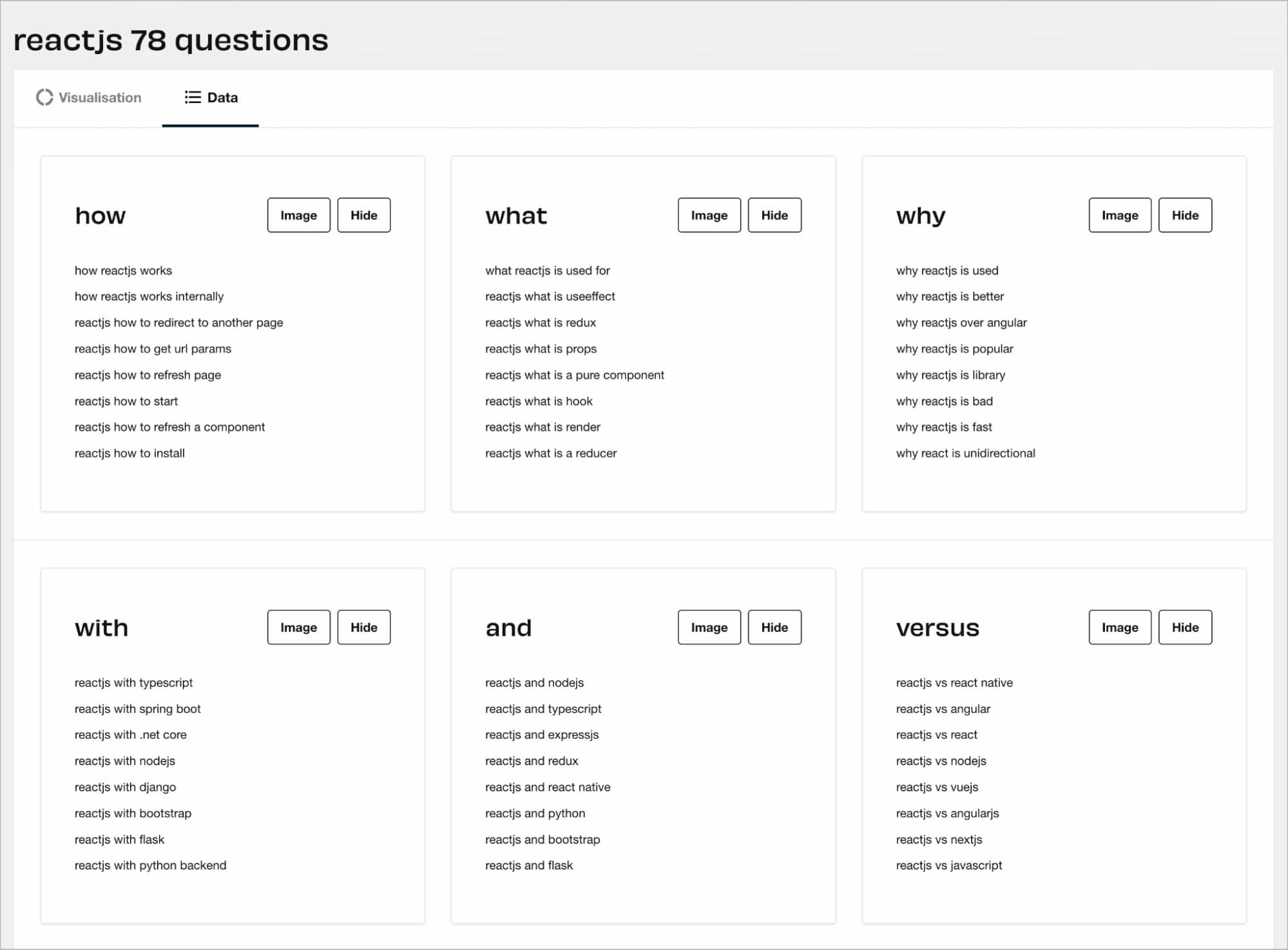
Pick a question that you feel comfortable answering, and start writing about it.
Note: These are the **top** questions about “reactjs” from Google search, so you imagine the volume your article would get if it landed on the first page!
### [ubersuggest.org](http://ubersuggest.org/)
[ubersuggest](http://ubersuggest.org/) is a freemium tool to generate keyword suggestions and content ideas.
Here’s the screenshot of the top keywords and content ideas for “typescript”.
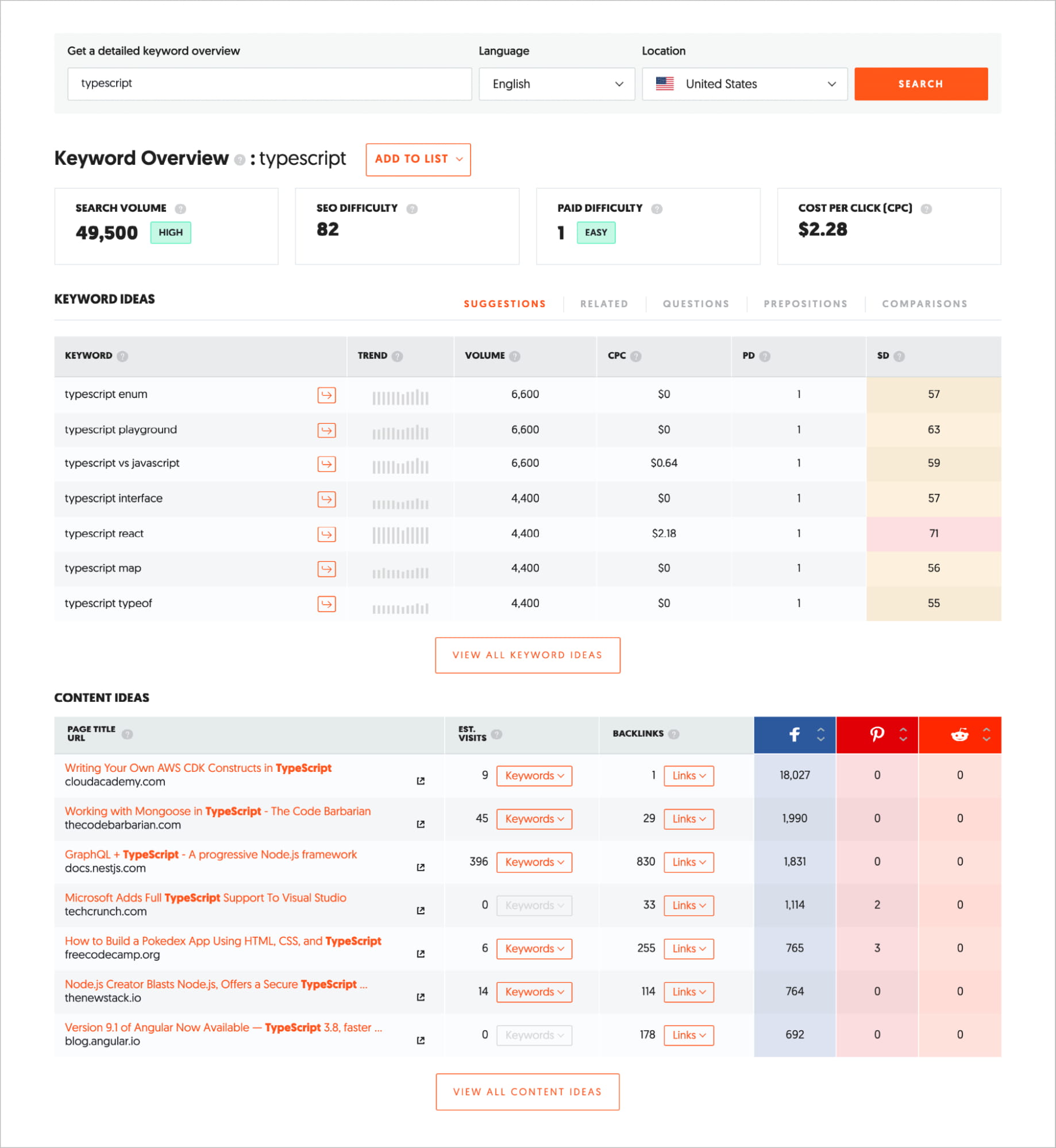
### [reddit.com](http://reddit.com/)
There are lots of programming-related subreddits which you can surf through to find interesting content to write about. Here’s a simple trick to see what others have been asking about a topic so that you can write about it.
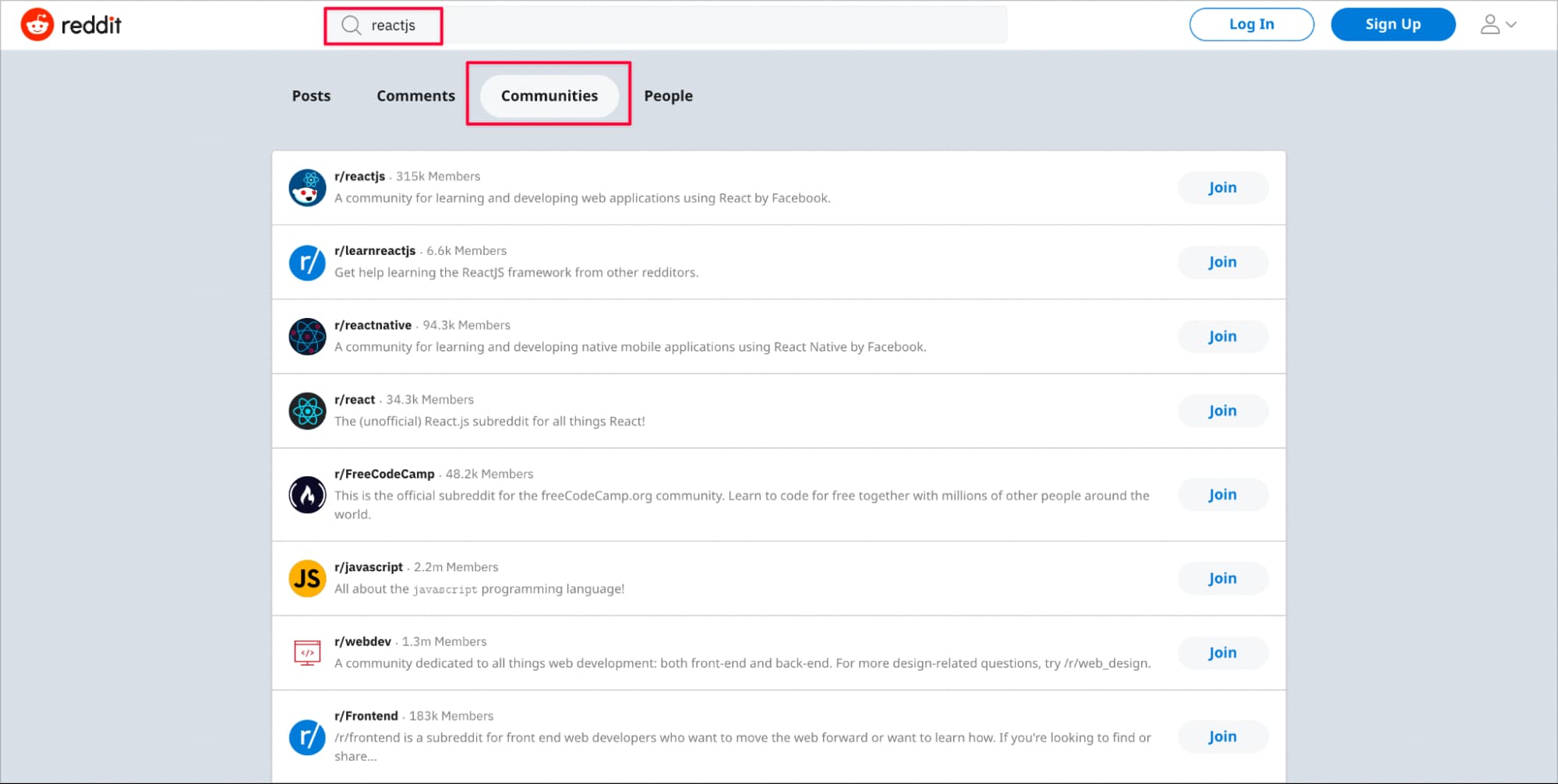
First, you need to find a subreddit for a language/framework/tool. Type a keyword in the search box at the top and select “Communities”. For example, here are the top subreddits for reactjs. The first subreddit in the list [reactjs](https://www.reddit.com/r/reactjs) has around 300k+ members!
Next, go to one of these subreddits and type “how” in the search box to see all questions that members asked. You can further sort these questions by week/month/year/all time to filter the most popular questions. Browse through these highest-voted questions and see if you could answer any of these in the form of an article.
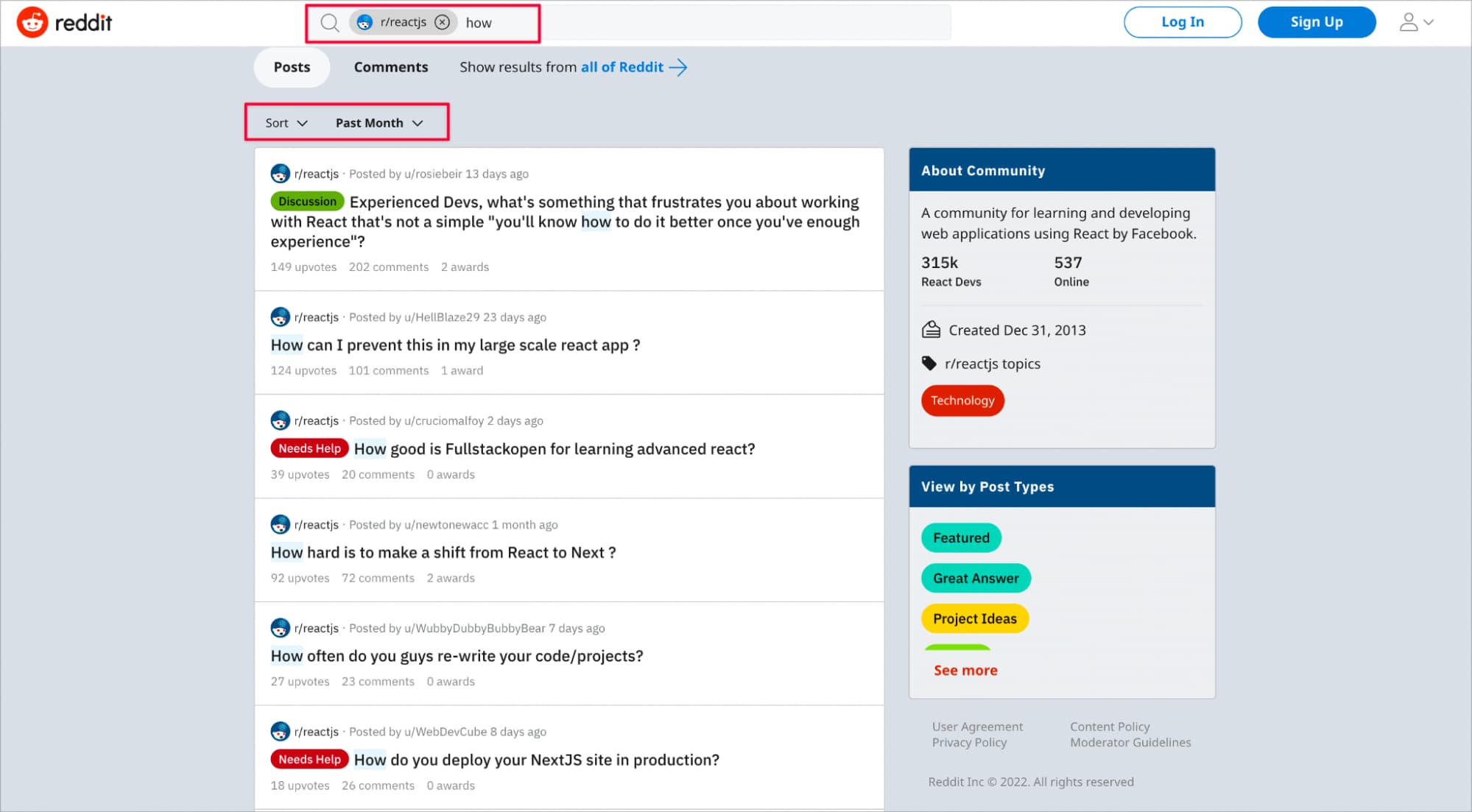
### [quora.com](https://quora.com/)
Get inspiration from people asking questions on a topic you know about. Type a keyword in a search term and hit enter.
The below image shows what people have been asking about the [NextJS](https://nextjs.org/) framework.
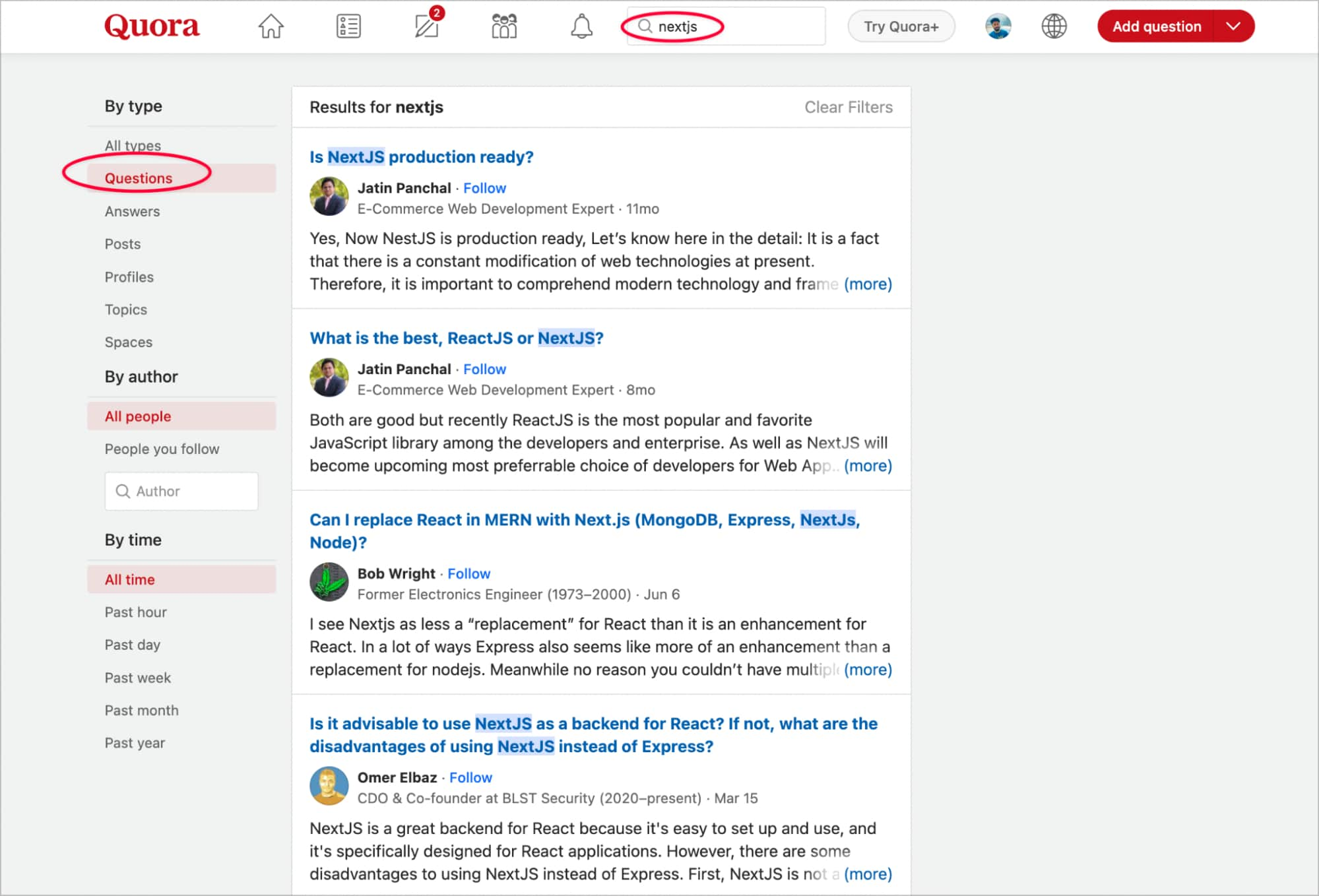
### [dev.to](https://dev.to)
[dev.to](http://dev.to/) is an online community for software developers where they can write blog posts, discuss topics, and help one another out.
You can browse [various tags](https://dev.to/tags) and see what people have been discussing to get inspiration.
Here are the top monthly posts for tag #django:
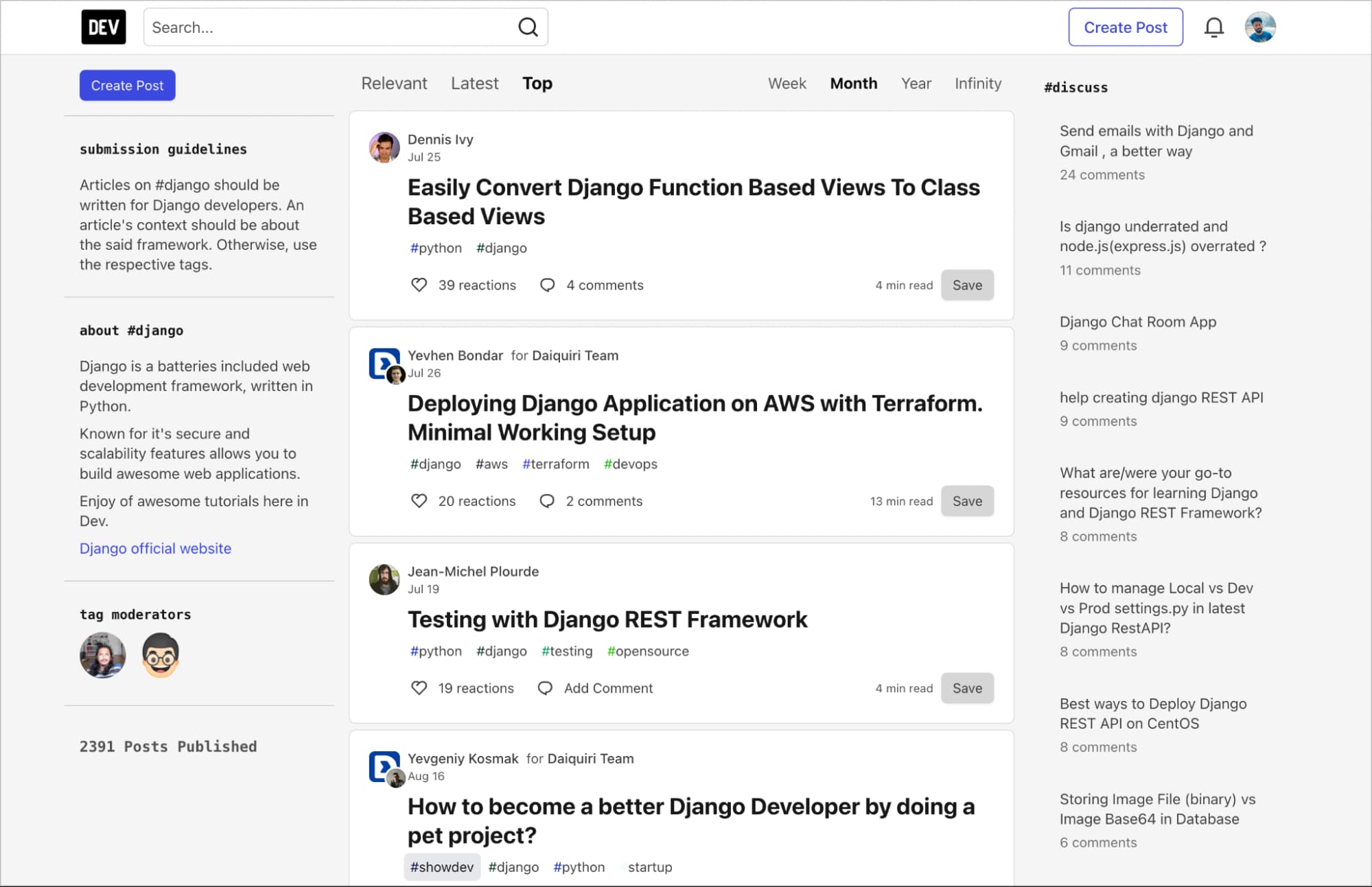
### Using content research tools
Many professional bloggers use content research tools like [Ahrefs](https://ahrefs.com/content-explorer) or [BuzzSumo](https://buzzsumo.com/content-discovery/) to get a streamlined flow of hot and trending topics to write about.
These tools can help you:
- Discover the words and phrases your audience is searching for
- Find the most popular content in your niche across different platforms
- Access real-time views of viral trends for any topic, domain, or location
- Find low-competition topics to write about
Note: these are paid tools and cost around ~$99/month.
### Explore trending topics
These free tools are useful for discovering broader trending topics over time:
- [explodingtopics.com](https://explodingtopics.com/) - Discover emerging technologies and trending topics by category, pick a topic that interests you, and write about it.
- [Google Trends](https://trends.google.com/trends) - Google Trends is a website by Google that you can use to analyze the popularity of top search queries in Google Search. Enter a keyword and see related topics, top queries, interests over time, demographics, etc.
## Get inspiration from other people’s tech blogs
### From your favourite bloggers
Do you follow any blogger whose articles you find to be quite enjoyable? What topics do they usually write about? If you’re interested in reading about these topics, why not write about them as well?
### Discover the best developer blogs for your tech stack for inspiration
If you don’t know many tech bloggers, check out this live list of the best and trending developer blogs. [https://bloggingfordevs.com/trends/](https://bloggingfordevs.com/trends/) You can filter blogs by tech stack as well. Interestingly this site was built by a tech blogger, [Monica Lent](https://monicalent.com/blog/).
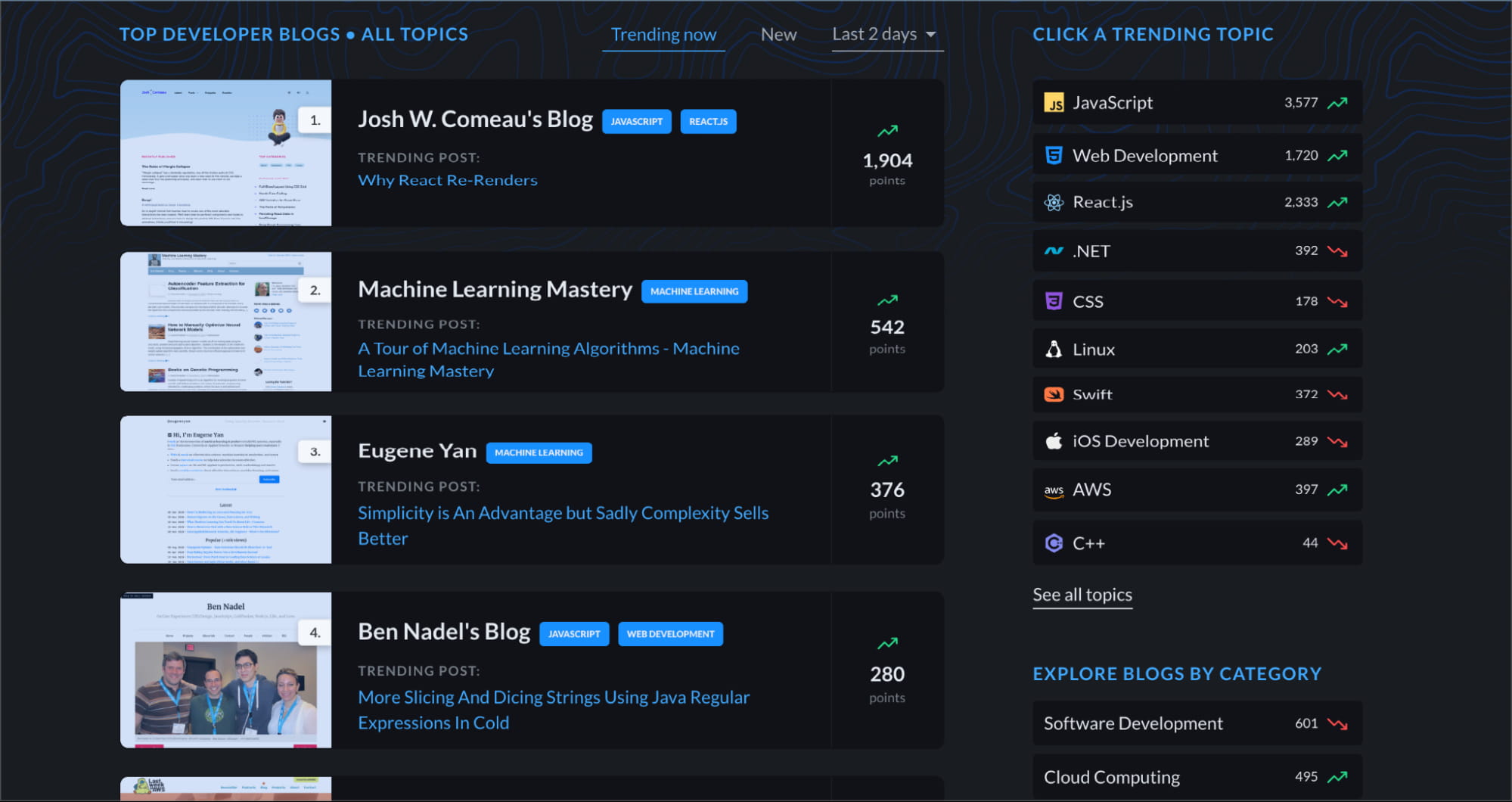
## Summarise concepts from long-form content
The knowledge present in long-form content has much more depth than what you usually find in articles or Youtube videos. So, if you’ve read any book or completed a course that helped you in your career or life, it’s an excellent opportunity for you to put quality content out. You could summarise the main concepts that stick with you and share them in the form of articles.
Examples:
- Implementing Abstract Factory design pattern in Go
- Data replication strategies on the server
- System design of notification service
- Detecting anomalies using Isolation Trees
## Conclusion
I hope this guide has given you enough resources to help you find inspiration for your next article. Start writing about the topics you’re interested in, or that you think will help others. Sometimes you’ll get multiple ideas, write them down and build your own repository of drafts that you can pick from. It’s okay if you think your content is not that great; just like other skills, you’ll get better the more you write. Remember, publishing something is still better than publishing nothing.
PS: Don’t forget to bookmark this article so that you can quickly revisit it next time you hit writer’s block. I’ll also be adding more resources as I find them.
---
<center>
<img src="https://monadical.com/static/logo-black.png" style="height: 80px"/><br/>
Monadical.com | Full-Stack Consultancy
*We build software that outlasts us*
</center>
